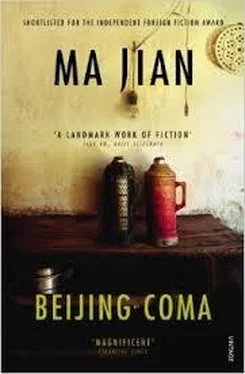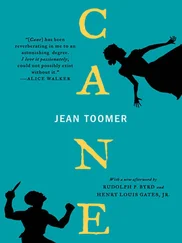The night often caught me unawares. It would slip out from under tricycle carts and from around street corners, and blot out the dusk. I would have to grope my way home. But it always knew which route I’d take, and would follow behind me all the way. The further I ran the darker it became. Faces grew indistinct. My body seemed to shrink into the gloom. The entrance to the opera company’s dormitory block opened its black mouth to me. I knew I’d have to drag myself through it in order to get back to our room. Sometimes there would be a light shining in the stairwell, so faint that all I could make out were the bicycles propped against the banisters and the Chairman Mao slogans painted on the walls. Usually there was no light at all, because the residents had a habit of stealing the bulbs when no one was looking, and since the batteries of my torch often ran out, I’d have to walk upstairs in the pitch dark. I hated the dark — that vast, untouchable substance.
Whenever I reached the entrance, my scalp would go numb, and I’d cry out: ‘Mummy, Mummy!’ If Lulu was back already, she’d poke her head out from her family’s room on the ground floor — sometimes all I’d see were her leg and half her face — and make strange noises to frighten me. She knew all my fears and weaknesses. I hated her. Sometimes, I’d kick her door as I passed.
I remember when we were about nine or ten her mother, who worked in the opera company’s accounts office, took her away for the whole summer. When I saw her again on the first day back at school her face was tanned. Her body had sprouted up like a needle mushroom after the rain, but her head was still the same size. It looked as though it had been planted onto someone else’s body.
On the way to school, her longer legs allowed her to stride out in front of me. The red skirt that reached down to her knees, and her left arm with its Young Pioneer red armband, moved with great lightness. I’d watch the petals printed on her skirt shudder over her bottom. On the straight path that ran through the yard it was impossible for me to keep up with her. Whenever she heard me move closer, she’d quicken her pace. My only chance to catch up came when the path turned into the main road. She’d always stop there and glance back to see if I was still behind, and I’d take advantage of this moment to sprint over to her. One time when she turned round she tossed me a plum, but I didn’t catch it. The purple fruit rolled down the path, then came to a stop. ‘You idiot!’ she cried out, taking a few steps towards me. ‘No wonder you haven’t been allowed to join the Young Pioneers.’ When she spoke to me I could see her white teeth…
The images are as light and brittle as falling leaves. Cells drift through the fluids of your body, leaving no trace.
Lulu fades away, and all I see is a red plum rolling down a pavement… I remember the earthquake that shook northern China in 1976, a few weeks before Chairman Mao died. I was about to start secondary school. My father was granted a month’s leave from the Shandong camp so that he could look after us in Beijing. Although the tremors in the capital had been faint, everyone was told to sleep outside for a month in case there were any aftershocks. The residents of the opera company’s dormitory block moved into a large tent that had been erected for us in the yard. My parents, brother and I had to share a single camp bed. I slept so close to my father that our noses touched. One night, when the rain was beating down onto the plastic sheeting above our heads, my father glared at me, his eyes cold with fear, and whispered, ‘Don’t go over to the tree. The officers will take a note of your name. Remember, you’re the son of a rightist — you must learn to live with your tail tucked between your legs.’
The tree he was referring to was about a hundred metres from our tent. A few days after Mao died, someone had hung dummies of the four leaders of the Central Committee from the tree’s branches.
My father didn’t know that on the way home from school that day, I’d squeezed into the crowd that had gathered around the tree and taken a look. There were three male dummies labelled Wang Hongwen, Zhang Chunqiao and Yao Wenyuan, and one female labelled Jiang Qing. They swayed back and forth in the breeze.
I can’t remember much about that month in the tent. But I remember one meal we all had together. There was fried chicken and beer. My father cooked a large pot of braised rice noodles. He added to it some dried fungus he’d brought with him from the camp. It was full of sand, but it let off a delicious aroma that filled the tent. As he stirred the pot, he turned his red face to me and gave me one of his rare smiles. When he’d returned home for a few days the year before, he’d slapped me in the face for tearing down a large, handwritten political poster.
It was during the weekly residents’ meeting in the yard. He played a tune from the ‘The Red Detachment of Women’ on his violin, then another one on his accordion. All the kids sang along with him: ‘ The Red Detachment of Women are Chairman Mao’s most faithful soldiers …’ I could hear my brother’s flat tones squeaking above the other voices. A few minutes later, the chairwoman of the neighbourhood committee rose to her feet and said: ‘Please can all parents ensure that their children attend the cultural activities we organise every Sunday.’ Then she pointed to the large noticeboard beside the front gates and said, ‘Someone has torn off the corner of that big-character poster criticising Lin Biao and Confucius. Who did it?’
‘Me!’ I blurted. Everyone’s eyes turned to me, and then to my father.
I saw a look of terror flash across his face. He was sitting under a large tree. Everyone could see him. He lifted his hands from his violin and locked them tightly together.
‘Why did you tear it?’ my mother said, pulling me up onto my feet.
My father’s frightened face grew sombre. No one could have respected a man who had such a cowardly expression.
‘I was going to the toilet and I forgot to bring some paper with me, so I tore off a small corner of the poster.’
‘I tore some off too!’ admitted a boy who lived on the first floor. He dug into his pocket and pulled out a scrunched-up ball of paper, then showed everyone the Chairman Mao badge that was wrapped inside it. His grimy neck began to redden.
The chairwoman cleared her throat and spat onto the ground. ‘Dai Changjie, as a rightist, you should be keeping a close eye on your children’s ideological education to make sure they don’t follow the same path as you,’ she said, then glaring at my mother, added, ‘And Huizhen, you must be stricter with your younger son. He’s been spotted playing with the bells of the bicycles parked over there on several occasions.’
‘I know that my ideology still needs some more remoulding,’ said my father, twisting his fingers. ‘I want to learn from people like you who have a high level of political consciousness.’ Then he rose to his feet, walked over to me and slapped me in the face. Lulu, who was standing next to me, jumped back in fright. I began shaking uncontrollably. The noise of the slap shuddered through my body like a clap of thunder.
I hated him. My teacher had told me that even if my father gained rehabilitation, I would still be banned from joining the army. I wanted the police to arrive immediately and drag him back to the labour camp.
As you shrink back inside your body, your childhood fears flicker through your mind. All the feelings you’ve felt in the past have been sheltering inside your flesh.
I can see my body soaking in the hot pool of a public bathhouse. My memories seem as muddled and random as the contents of a rubbish bin… It was a cold winter night. With a padded jacket draped over my shoulders, I walked towards the bathhouse, carrying my soap and towel in a plastic string bag. I usually took my brother with me, but this time I was going alone. I’d made up my mind that tonight I’d lower myself straight into the hot water and wallow there for some time, rather than edging myself in hesitatingly before quickly jumping out again, as I usually did.
Читать дальше












